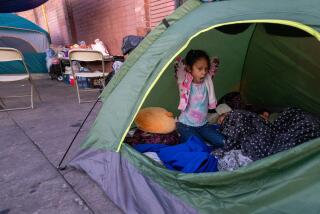Defense Argues Sanctuary Workers Felt Need to Help Central American Refugees
- Share via
TUCSON — Attorneys for 11 sanctuary movement members on trial here on illegal alien smuggling charges told jurors Tuesday that their clients simply were God-loving people who opened their hearts to Central American refugees.
The attorneys sought to counter a portrait of the 11 as “generals” and “foot soldiers” in a three-tiered criminal enterprise that was drawn for the jury Friday by special assistant U.S. Atty. Donald Reno in his opening statements.
The opening statements by the defense were interrupted by harsh exchanges between the defense attorneys and U.S. District Judge Earl H. Carroll, who has made it clear that he intends to try the case strictly as an alien smuggling action and would severely limit testimony as to the motives and religious background of the defendants.
Religious Choices Stressed
The attorneys managed to inject frequent references to the defendants’ religious preferences and how the sanctuary workers came to feel the need to help Central American immigrants.
At one point defense attorney James J. Brosnahan asked the judge to declare a mistrial because, Brosnahan contended, Carroll had shown through facial expressions that he was “visibly upset” with defense attorneys and might unfairly bias the jury.
Carroll denied the motion. He later issued a warning to the defense after Reno protested that the defense attorneys’ statements exceeded the judge’s guidelines about how much evidence could be disclosed to the jury regarding the defendants’ motives in helping the aliens.
The defendants were described as being affected by the stories of the hardships being suffered by Salvadorans and Guatemalans who began passing through Arizona in increasing numbers in 1980 and 1981, many of whom contended they were seeking refuge from political violence in their countries.
“They needed to respond to the need that was here,” said A. Bates Butler III, attorney for defendant Phil Willis-Conger.
Most often, he said, they responded by giving clothing and medicine to the immigrants, as well as offering to make telephone calls to relatives and by linking them up with low-cost attorneys. “No one was asked about their documents before assistance was provided,” Butler said.
In addition, Brosnahan said, “no one in this case ever joined a criminal conspiracy. “Some of them had never met. They were brought together only when they were indicted.”
One of the defendants, Wendy LeWin, had learned about the plight of the refugees while working as an interpreter for the federal government, her attorney, Ellen Yaroshefsky, said.
Arguing that there was no conspiracy, Yaroshefsky said: “As the church leaders will say, there is but one leader here--and that leader (God) is just beyond the reach of the immigration service.”
The government contends that the illegal aliens are seeking jobs, not fleeing persecution.
The 11 defendants are charged with a total of 44 felony counts of conspiracy to smuggle, harbor and transport illegal aliens. The trial is expected to last through January.
More to Read
Sign up for Essential California
The most important California stories and recommendations in your inbox every morning.
You may occasionally receive promotional content from the Los Angeles Times.













